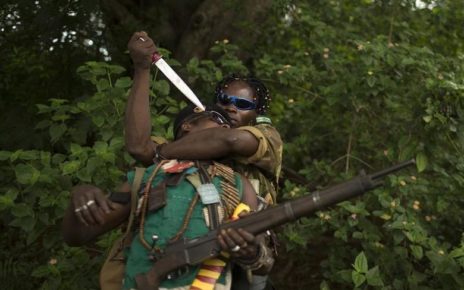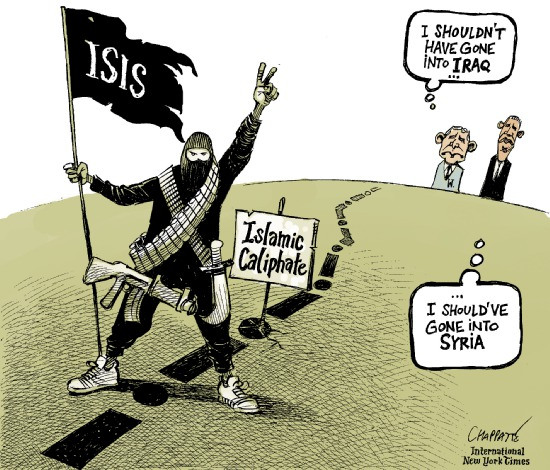By Robert Baines.
On Thursday night, after several days of hard bargaining, the 28 NATO member states came to a consensus that the alliance would take over command responsibility for the no-fly zone in Libya. NATO’s Secretary General, Anders Fogh Rasmussen, stated that NATO has decided to assume responsibility for the no-fly zone mandated under the United Nations Resolution 1973. Groundwork has also been laid for the alliance to take over complete command of the offensive and humanitarian missions, currently handled by an ad hoc coalition supported mainly by the United States.
Hillary Clinton, Secretary of State, announced that the U.S. agreed “to transition command and control for the no-fly zone over Libya to NATO”. In fact, the U.S. has been eager to step back from its role as leader of the present coalition in favour of a less prominent position within the NATO framework. NATO will coordinate the no-fly operations which utilize contributions from many non-NATO states, including Qatar and the United Arab Emirates. The command structure will be similar to that being used in the UN mandated mission in Afghanistan, where NATO directs the International Security Assistance Force (ISAF).
However, despite NATO’s agreement to command the enforcement of the no-fly zone, it is still unclear whether the alliance will be able to come to a consensus to take over the offensive aerial assaults on the forces still loyal to Colonel Muammar Gaddafi. The largest obstacle in reaching the necessary consensus required in the North NATO Council, NATO’s political governing body, is the Turkish concern over NATO’s involvement in aerial bombing of Libyan targets and the likely civilian casualties that would result. Turkey’s representative to NATO was able to agree to the consensus concerning the no-fly zone only after a vote in the Turkish Parliament approved a contribution to those operations in Libya.
Even if the offensive and no-fly operations are not combined under NATO command, the resulting situation will not be very different from the current parallel operations undertaken by the U.S. outside of the NATO framework in Afghanistan, where ISAF has coordinated with the separate US operation Enduring Freedom for a decade.
The versatility of the NATO alliance makes it valuable in the present situation in Libya where there are multiple levels of actors. Ever since the founding of the alliance in 1949, it was believed that NATO should work closely with the international community and serve as a tool to fulfil certain mandates of the United Nations. However, inextricable from the fulfilment of the current mandate, the most important consideration at this juncture is for the alliance to forge a comprehensive plan of operation and an exit strategy. There is particular concern regarding the lack of cohesion between the goals of protecting Libyan civilians and ousting Gaddafi. If the overall plan is to wait for a Libyan solution, the time-line for these operations could stretch out significantly. Hoping for a coup within the Libyan government or waiting for rebel forces from the East to liberate the rest of the country could mean waiting and hoping for a very long time.
Canadian General Likely To Command Operations
While NATO member states grapple with these wider concerns, it appears that command of the NATO operations shall be directed from Naples, Italy, by the local NATO Joint Task Force. At this time, it has been reported that command will be held by Canadian Lieutenant General Charles Bouchard*, the Deputy Commander of Allied Joint Force Command Naples, Italy.
In the past, General Bouchard has performed duties as Deputy Commander of the Continental US NORAD Region, Commander of the 1st Canadian Air Division of the Canadian NORAD Region and Chief of Staff, Supreme Allied Command Transformation in Norfolk, Virginia. The General will now have ultimate responsibility for the implementation of various NATO and non-NATO air and naval components to enforce the UN mandated no-fly zone. He would also likely assume a further command role in the event that NATO takes control of offensive operations currently being led by the United States.
This coincidence, combined with the Canadian government’s contribution of 6 CF 18’s, 2 CP140’s and 430 Canadian Forces personnel, has made Canada’s modest involvement in the Libyan intervention relatively prominent. Yet, it is still an open question as to how effective these efforts will be in resolving the current situation in Libya. Having achieved headway in coordinating efforts to halt Col. Gaddafi and ensure the delivery of humanitarian aid, – despite continued manoeuvring and wrangling among NATO members – there is a chance that this UN mandated intervention may prove a model for NATO’s future role in the world. However, this will ultimately depend on whether or not Gaddafi’s grasp on his political and war machines begins to slip.
*General Bouchard has been a long time friend to the NATO Council of Canada and in 2009 the Council organized a roundtable where he spoke on the enduring value of NORAD.
http://www.bbc.co.uk/news/world-africa-12856665
http://www.guardian.co.uk/world/2011/mar/24/france-turkey-nato-libya
http://www.vancouversun.com/news/NATO+command+Libya+zone+enforcement/4501113/story.html
http://www.journalgazette.net/article/20110325/NEWS04/303259975
http://preview.oxan.com/Analysis/DailyBrief/Samples/AirStrikesOnLibya.aspx
http://m.state.gov/md159100.htm
http://www.nato.int/cps/en/natolive/news_71763.htm
http://www.jfcnaples.nato.int/page11825719.aspx
Disclaimer: Any views or opinions expressed in this article are solely those of the author and do not necessarily represent those of the NATO Council of Canada.



